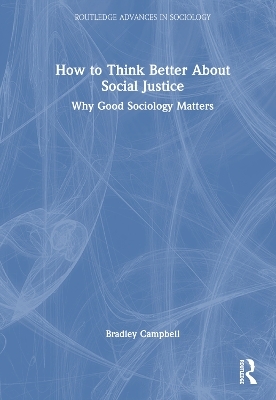
How to Think Better About Social Justice
Routledge (Verlag)
978-1-032-61628-5 (ISBN)
Those who are pursuing social justice too often fail to incorporate the insights of sociology, and when they do make use of sociology, they often draw heavily from claims that are highly contested, unsupported by the evidence, or outright false. This book shows why learning to think sociologically can help us to think better about social justice, pointing us toward possibilities for social change while also calling attention to our limits; providing us with hope, but also making us cautious. Offering a series of tips for thinking better about social justice, with each chapter giving examples of bad sociological thinking and making the case for drawing from a broader range of sociological theory and research to inform social justice efforts, it advocates an approach rooted in intellectual and moral humility, grounded in the normative principles of classical liberalism. A fresh approach to social justice that argues for the importance of sociological understanding of the world in our efforts to change it, How to Think Better About Social Justice will appeal to scholars and students of sociology with interests in social justice issues and the sociology of morality, as well as those working to bring about social change.
Bradley Campbell is a professor of sociology at California State University, Los Angeles. His work examines moral conflict, including violent conflicts such as genocide as well as nonviolent conflicts on college campuses over politics and free speech. He is the author of The Geometry of Genocide: A Study in Pure Sociology and co-author of The Rise of Victimhood Culture: Microaggressions, Safe Spaces, and the New Culture Wars. He has also co-authored op-ed articles about contemporary moral conflicts that have appeared in Time, The Chronicle of Higher Education, and the New York Times.
1. Learn About the World Before Changing It: Why We Need Sociology 2. Acknowledge Uncertainty: Learning from Multiple Theories 3. Don’t Treat Ideology as Science: The Problem with Critical Theory 4. Distinguish Between Facts and Values: The Limits of Sociology 5. Be Willing to Make Tradeoffs: Dealing with Warring Gods 6. Make Room for Opposition: The Reality of Pluralism 7. Accept Imperfection: The False Promise of Utopia 8. Embrace Humility: A Case for Classical Liberalism
| Erscheinungsdatum | 08.02.2024 |
|---|---|
| Reihe/Serie | Routledge Advances in Sociology |
| Verlagsort | London |
| Sprache | englisch |
| Maße | 178 x 254 mm |
| Gewicht | 385 g |
| Themenwelt | Sachbuch/Ratgeber ► Gesundheit / Leben / Psychologie |
| Sozialwissenschaften ► Pädagogik ► Sozialpädagogik | |
| Sozialwissenschaften ► Soziologie ► Allgemeines / Lexika | |
| Sozialwissenschaften ► Soziologie ► Empirische Sozialforschung | |
| Sozialwissenschaften ► Soziologie ► Gender Studies | |
| ISBN-10 | 1-032-61628-8 / 1032616288 |
| ISBN-13 | 978-1-032-61628-5 / 9781032616285 |
| Zustand | Neuware |
| Haben Sie eine Frage zum Produkt? |
aus dem Bereich


